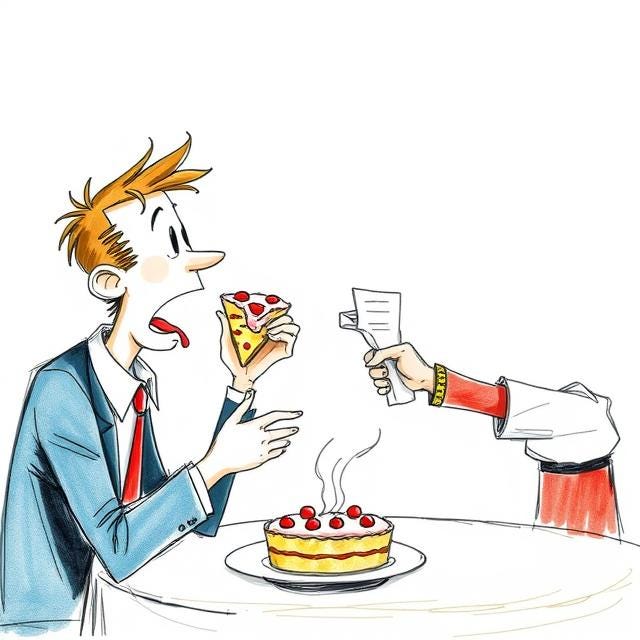A year of Labour
One year since the election, a tough anniversary party for Starmer's Labour
Tears, U-turns, plummeting popularity, inflation and a world at war - it’s been a tough first year for Labour.
The party was carried into number ten by a public that was tired of the Tories and dismayed with the state of the country. I think, as I’ve said before, that Labour are doing a good job (but the bar is low).
But the public at the large and the media seem to disagree: taking lumps out of Starmer whenever they can. So what’s gone wrong?
No plan
Speaking to Nick Robinson this week, Starmer said: “I'm not one of these ideological thinkers, where ideology dictates what I do. I'm a pragmatist.”
That’s not necessarily a bad thing. The country (and the world) is moving away from the traditional left-right divide and towards something more nebulous, where parties like Reform can credibly support both hard-left and hard-right policies.
But Starmer isn’t just lacking an ideology, he’s also lacking a plan. There is no grand theory of governing that guides what he does, it’s just a game of throwing things at the wall and seeing what sticks. Scrapping NHS England, putting VAT on private schools, tightening welfare eligibility. They’re all reasonable policies, but they’re also a bit … random.
It’s unusual, just a year into government, for Starmer to have a list of self-confessed mistakes. He regrets his ‘Island of Strangers’ speech earlier this year, he told the Observer. Hiring Sue Gray was a mistake, he told the BBC. His early speeches were too negative, he told his biographer.
It speaks to someone making it up as they go, not following a playbook. And that makes sense, Labour has no institutional memory of governing. The party came into government not especially prepared for it.
And in their desperation to win the election (because imagine the humiliation if they did not) they made promises to please the voters, not govern the country. They should never have committed not to raise tax, for example (a year ago this week, in my first Monday Memo, I wrote: “By the way, there are many reasons I remain unconvinced by Starmer. Top of the list is his steadfast refusal to raise taxes.”)
Vote Starmer, get Abbott
The public rejected the fantasy economics and rampant anti-semitism of Labour’s hard-left in 2019, but the virus is still lodged within the party. That couldn’t have been clearer last week, when Starmer’s sensible proposals to reform the welfare system were blocked by his own MPs.
Starmer has two problems. First, Corbyn’s cronies remain on the benches, causing trouble. Had Starmer felt more confident going into the election, he probably would’ve been wise to ban them from standing for Labour and forced them to stand as independents (as he did with Corbyn).
But Starmer’s vulnerability meant the likes of Diane Abbott and Zarah Sultana were free to stand and win as Labour MPs, then fundamentally undermine the Labour party at every opportunity.
It absolutely beggars belief that Diane Abbott, for example, has retained the whip. Her entire Twitter feed is attack lines on the Labour Party and Starmer. I genuinely believe she wants Labour to lose the next election: that should probably preclude someone from being an MP for the party.
His second problem is the new intake. New MPs are always trouble makers (they were the first to attempt to oust Boris Johnson in the pork pie plot) but for Labour the problem is particularly pronounced. Here, you have a lot of young MPs who view Tories as evil cost-cutters, and Labour as big spenders. But they’ve entered a Parliament where, for the last almost decade, the Tories have been the happy-go-lucky spenders, leaving an enormous debt bill that needs to be addressed through cuts and tax rises.
This is not what they signed up for.
New MPs have low prospects of bagging a ministerial job, so little to lose from rebelling, and possibly a lot to gain from TV interviews, plaudits from the party old-hat, and viral Tweets. Just as they’ve rebelled on the welfare bill, expect them to rear their head again and again in this government.
Cakeists
But there is also, undeniably, a culture shift in the public.
Since COVID, we expect much, much more from the government - and we’re prepared to give much less.
69% of Brits want to see NHS spending increase, but 58% of Brits don’t want their taxes to increase (YouGov) - we want to have our cake and eat it too (or, perhaps more appropriately, have our cake, eat it and skip the bill, too).
It’s impossible to placate a public that’s seen the government pay half their restaurant bills and their salaries, and give out hundreds of pounds of council tax rebates - without ever raising tax. Expectations of what the government can do have just fundamentally shifted.
I also sense that we’re hungrier for scandal. The freebies scandal, for example, seemed at one point like it might knock Starmer off track. It was an error from Starmer and his cabinet, but it was hardly the worst thing in the world (Boris Johnson did worse than accept freebies before he’d put his slippers on).
Wikipedia lists an average of 8 political gate-scandals per year in the last 5 years, compared to just 3 in the first 5 years of the 2000s. The media and the public are clearly seeking out more scandals.
Starmer is doing a good job
My overarching perspective is that Starmer is good at governing, bad at politics.
He’s making sensible moves, but his lack of a plan or story means he is not bringing the country along, and he is not bringing his party along.
And the part of his brain that wins elections seems to be surgically detached from the part that makes decisions (he’s abandoned just about all of his campaign pledges that saw him win the Labour leadership).
But maybe that’s what we need right now: Starmer is acting as something of a caretaker Prime Minister. Slowly, the economy is recovering from the Liz Truss kamikaze mission. The health service is recovering from 14 years of Tory neglect. Even trust in democracy is rising. I suspect, through diplomatic intervention, small boat crossings will soon start to fall, and Starmer will wrangle his party enough to get the welfare bill under control.
He is never going to be Thatcher, Churchill or Blair - but in a way that is a good thing. He is unfussed about his public perception of post-politics career. He is not particularly bothered by his popularity in SW1. If he can keep his head down and give the public a tangible sense of improvement in the country, Labour can win again.




